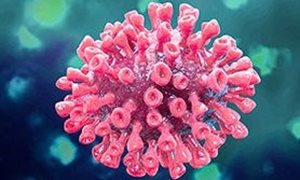
In a recent article in Nature Communications, researchers from the department of Medical Microbiology uncovered intriguing dynamics in the production of the transmission stages of malaria parasites, gametocytes.
Children with incident malaria infections and children with chronic infections were followed on a daily basis to determine what proportion of parasites commit to become gametocyte. With novel molecular markers developed by Kjerstin Lanke, they could for the very first time quantify gametocyte commitment as well as the subsequent release of male and female gametocytes into the circulation.
Using these novel assays, the work demonstrated that the early phase of malaria infections is characterized by a low commitment to gametocyte production. The sparse gametocytes that are produced are hardly infectious to mosquitoes and this infectivity is further decreased if mosquitoes ingest gametocytes at a moment of fever. In contrast, chronic infections produce more gametocytes that are often clonally complex and highly infectious gametocytes. This work underlines the importance of early infection detection to not only prevent severe illness but also prevent transmission of infections to the community.
The work was led by Aïssata Barry, a PhD student from Burkina Faso in the team of Teun Bousema, for whom the work is a concluding chapter of her thesis.View article in Nature Communications.
Aïssata Barry and Teun Bousema celebrating their paper in Ouagadougou.
Related news items

Invasive fungal infections in influenza and COVID-19
8 July 2020 The Aspergillus fungus is found in the lungs of many COVID patients. A parallel occurs with influenza patients, who often develop a serious fungal infection. Although such a serious fungal infection seems to occur less frequently in COVID-patients, alertness remains necessary, go to page
Early symptoms in Radboudumc healthcare workers who were tested for SARS-CoV-2
12 May 2020 In Eurosurveillance RIHS researcher Alma Tostmann and colleagues from the Radboudumc COVID-19 Team describe that general symptoms like fever, headache, general malaise and muscle ache were associated with a positive SARS-CoV-2 test. Respiratory symptoms however, were not predictive for SARS-CoV-2. go to page
Dealing with COVID-19 in low- and middle-income countries
26 March 2020 RIHS researcher Joost Hopman believes that low-and middle-income countries should intensify their preparedness for a possible COVID-19 outbreak. This was the core message of an opinion article that he wrote at the request of the medical journal JAMA. go to page
ERC Consolidator Grant for Bousema and Sechopoulos
12 December 2019 Teun Bousema and Ioannis Sechopoulos each receive an ERC Consolidator Grant of around two million euros. This European research subsidy will enable them to carry out research for the next five years. go to page
Two RIHS researchers in top 1 percent by citations
28 November 2019 Bart-Jan Kullberg and Jacques Meis, made it to this year’s list of highly cited researchers. Researchers in this list are selected for their exceptional research performance and are regarded to have had a major impact on fellow scientists. go to page
